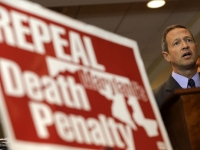News
Will 5 Men on Maryland Death Row Live or Die?
Governor O Malley: No decision yet

(Source: Maryland Department of Corrections)
USPA NEWS -
ANNAPOLIS, MD “” Nearing the close of a years-long fight, the debate on full repeal of the death penalty is close to ending, and Maryland is poised to become the sixth state in the country to repeal its death penalty law.
The proposed law would mandate life in prison without possibility of parole.
The proposed law would mandate life in prison without possibility of parole.
Democratic Governor Martin O´Malley, has championed the repeal, and says he will proudly sign it into law. But the Governor still faces a tough choice, one he has been less than clear with his intentions on “”what to do with the five remaining Maryland inmates who sit on Maryland´s death row?
The repeal legislation makes no provision for the five men sentenced to death, which even after a repeal of the death penalty could legally still be executed, should they exhaust all of their constitutionally allowed appeals.
The repeal legislation makes no provision for the five men sentenced to death, which even after a repeal of the death penalty could legally still be executed, should they exhaust all of their constitutionally allowed appeals.
Under the Maryland Constitution, the governor has unlimited power to pardon or commute sentences, and many death penalty opponents have encouraged O´Malley to simply clear death row if he is morally opposed to the death penalty. The Maryland Senate added an amendment to the repeal bill expressing its will that all death row inmates have their sentences commuted to life in prison without parole. The executive clemency decision, however, is solely up to Governor O´Malley.
O´Malley has three clemency options, says spokesperson Raquel Guillory: He can immediately commute all five-death sentences, commute each sentence on a case-by-case basis, or do nothing. He is not expected to make a decision until after the legislative session ends in April.
O´Malley has been notably reluctant to commute any sentences or grant pardons during his seven-year tenure. He´s only granted 50 pardons out of 690 requests as of last December, according to The Washington Post.
In addition, the Governor has only commuted two sentences; one where an accomplice served three times as long as the shooter, and another where a witness recanted testimony that sent a man to prison for nearly 30 years.
O´Malley has been notably reluctant to commute any sentences or grant pardons during his seven-year tenure. He´s only granted 50 pardons out of 690 requests as of last December, according to The Washington Post.
In addition, the Governor has only commuted two sentences; one where an accomplice served three times as long as the shooter, and another where a witness recanted testimony that sent a man to prison for nearly 30 years.
O´Malley´s clemency record is in line with his overall stance of being tough on crime, stemming from his background as a Baltimore prosecutor.
The majority of governors have broad, nearly unrestricted clemency power to pardon or commute sentences as they see fit. But few exercise that power regularly. It is something they take seriously, with pause, and tremendous consideration, afterall, we are talking about an individual's life.
The majority of governors have broad, nearly unrestricted clemency power to pardon or commute sentences as they see fit. But few exercise that power regularly. It is something they take seriously, with pause, and tremendous consideration, afterall, we are talking about an individual's life.
Maryland Death Row Death Penalty Commutation Life Without Possibility Of Parole Governor Tough On Crime Maryland General Assembly Governor Martin Omalley Senate President Thomas V. Mike Miller Speaker Mike Busch Life Death Kirk Bloodsworth
Liability for this article lies with the author, who also holds the copyright. Editorial content from USPA may be quoted on other websites as long as the quote comprises no more than 5% of the entire text, is marked as such and the source is named (via hyperlink).






